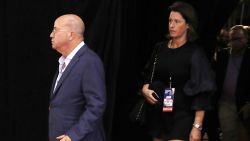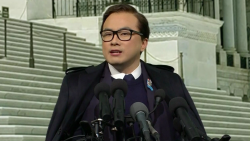A version of this article first appeared in the “Reliable Sources” newsletter. You can sign up for free right here.
Earlier this week, WarnerMedia chief Jason Kilar left staffers at CNN once again in a state of confusion when he announced that Allison Gollust, CNN’s chief comms and marketing officer, had resigned from the company. Kilar didn’t specifically say why Gollust had suddenly exited, but he did say in the same memo that an outside probe found that she, former CNN president Jeff Zucker, and former anchor Chris Cuomo had all violated the network’s news standards and practices rules.
But what specific rule—or rules—did Gollust break? Kilar didn’t say. While his memo announcing Gollust’s departure did include the added information about the probe finding S&P violations, Kilar didn’t directly tie the two together.
So why was Gollust ousted? On Friday evening a pair of stories, one in The New York Times and one in The Wall Street Journal, offered different accounts. The answer may be a version of “all of the above.”
Two different accounts
The Journal’s story, reported by Ben Mullin and Joe Flint, landed first. The paper, citing sources familiar with the matter, offered this account: that Gollust resigned because WarnerMedia “determined a statement she gave about her romantic relationship” with Zucker “was misleading,” and furthermore, because our media coverage (like every other outlet) quoted her statement, she “misled CNN’s audience.”
Gollust said her relationship with Zucker turned romantic during the pandemic—and Gollust’s camp maintains that her statement was and is true. “Allison has been clear that her relationship with Jeff changed during Covid,” her spokeswoman Risa Heller said Friday, “and regrets that they didn’t properly disclose it to WarnerMedia at that time. Continuing to publicly debate the private details of her personal life reeks of sexism and only further underscores WarnerMedia’s retaliatory actions against her.”
The Times’ story, which was published within minutes of The Journal, offered another version of events. Michael Grynbaum, John Koblin, and Emily Steel reported that Gollust had been ousted after discussing interview topics with former New York Gov. Andrew Cuomo, for whom she had briefly worked as a comms aide nearly a decade ago. According to the trio of Times journalists, Cuomo told Gollust about subjects he’d like to be asked about on air, Gollust “passed along the topics to CNN producers,” and then replied to Cuomo via email with one word: “Done.”
Standard practice or something more?
The New York Times’ story explaining Gollust’s ouster baffled some of my sources inside and outside CNN on Friday, given that it is extremely common in TV news to ask subjects — particularly newsmakers such as a high-level official — if they have any news they’d like to share or break during an interview. One of the topics Cuomo wanted to be asked about, according to the NYT, included a recent conversation he had with Trump. A careful read of the interview transcript at issue shows a probing Q&A and no signs of interference or Cuomo coziness.
Keith Olbermann, who sparred with Zucker at NBC, wrote on Twitter that he is the “last person to defend Zucker, Gollust, or either Cuomo, but pre-interviews in which potential questions and topics are disclosed to the guest, and/or the network is apprised of topics the guest would like to discuss, are standard practice in TV.” Puck’s Dylan Byers tweeted, “If this is AT&T/WarnerMedia’s silver bullet, they’re in big trouble.”
The Times did not print the full email exchange at the center of its story. The lone direct quote was Gollust’s single-word reply to Cuomo: “Done.” Which is to say, we are missing a lot of the background details. Was this an innocuous pre-interview procedure? Or is there damning info in the email exchange that the Times didn’t print? We don’t know.
Heller issued a statement contesting the Times’ story: She said Cuomo “suggested to Allison he hoped to be asked about three topics during an interview on CNN” and that she simply “relayed that information to CNN staffers.” Heller pointed out that “it is extremely common for newsmakers and elected officials to tell producers what topics they’d like to cover during an interview.” That’s true. It does not mean the hosts will ask. But Heller also said that Gollust “acted as the principal booker for Governor Cuomo during the early days of the pandemic,” adding, “This was well known by the entire network, and many producers relied on her for it on a regular basis.” I can’t speak for the “entire network,” but Brian Stelter and I did not know this.
Heller added, “WarnerMedia relying on this everyday practice as justification for dismissing Allison demonstrates how ignorant they are of journalistic practices, and further proves that her dismissal is nothing more than retaliation.”
The irony
WarnerMedia sources keep hinting that there is more. More of what? They won’t say. Maybe they legally can’t say. “Multiple ethical violations,” one of the sources told Stelter Friday night. But that could mean any number of things. And without details, Zucker and Gollust’s reps are reduced to punching at ghosts, unable to deny what’s not actually being alleged. The central problem in understanding the Gollust-Zucker ousters continues to be a lack of transparency from WarnerMedia. While Kilar said Gollust and Zucker violated company standards, he has not explained what those violations were. The Washington Post’s Erik Wemple pointed out Friday that “there’s some irony in a media company citing standards-and-practices violations without detailing them.” As Wemple put it, “Such suppression, after all, violates the supreme standard and practice: transparency.”
Denied severance
Meanwhile: Byers reported Friday that Zucker and Gollust “were denied severance by AT&T and that they are currently in talks with lawyers to assess their options for wrestling a payout from the telecom giant.” So will they sue? “They both feel like they are entitled to some multiple of that,” Byers reported, citing sources, “but they haven’t yet decided whether they have the appetite for a protracted legal battle.”


























